It’s noon, but the concert hall of the National Palace of Arts Ukraina, one of main theatrical venues in downtown Kyiv, is buzzing with activity.
Its giant main stage, which has welcomed Luciano Pavarotti, Monserrat Caballe, and Ennio Morricone, is being prepared for yet another show in the evening. Dozens of workers rush in and out, installing stage lights, testing loudspeakers, and unrolling bundles of cables.
Amidst this bustle, a tall bald man in his 50s sits on a bar stool in the middle of the stage. Dressed in simple jeans and a T-shirt, he instructs the stage crew, cracks jokes with the show promoters, and occasionally glances at a simple Android smartphone.
He doesn’t look like one of the most influential rock musicians of all time.
But this is Wolf Hoffmann, the lead guitarist and main composer of the legendary German-American heavy metal band Accept, an iconic name for metal lovers everywhere.
In the evening, Accept will throw a special kind of show in Kyiv. Along with amplifiers and sound effects hardware, the band’s road crew is also putting out rows of chairs and music stands on the stage — a symphonic orchestra will play behind Hoffmann’s guitar.
Accept’s concert in Ukraine is part of its Symphonic Terror Tour 2019, during which the veteran band combines the might and sharpness of old school heavy metal with the grandiosity of classical music.
Even more interestingly, Accept opted for the National Academic Orchestra of Folk Instruments (NAONI), a rather peculiar combination: heroes of distorted guitar together with an orchestra playing traditional Ukrainian folk music.
However, as Hoffmann says, the distance these two genres is what actually makes them sound so great together.
Just hours before the show in Kyiv on April 25, the legendary 59-year-old musician sat down with the Kyiv Post to chat about his passion for classical music, and also about what he knows about Kyiv and Ukraine, and his own plans to release a new Accept album next year.
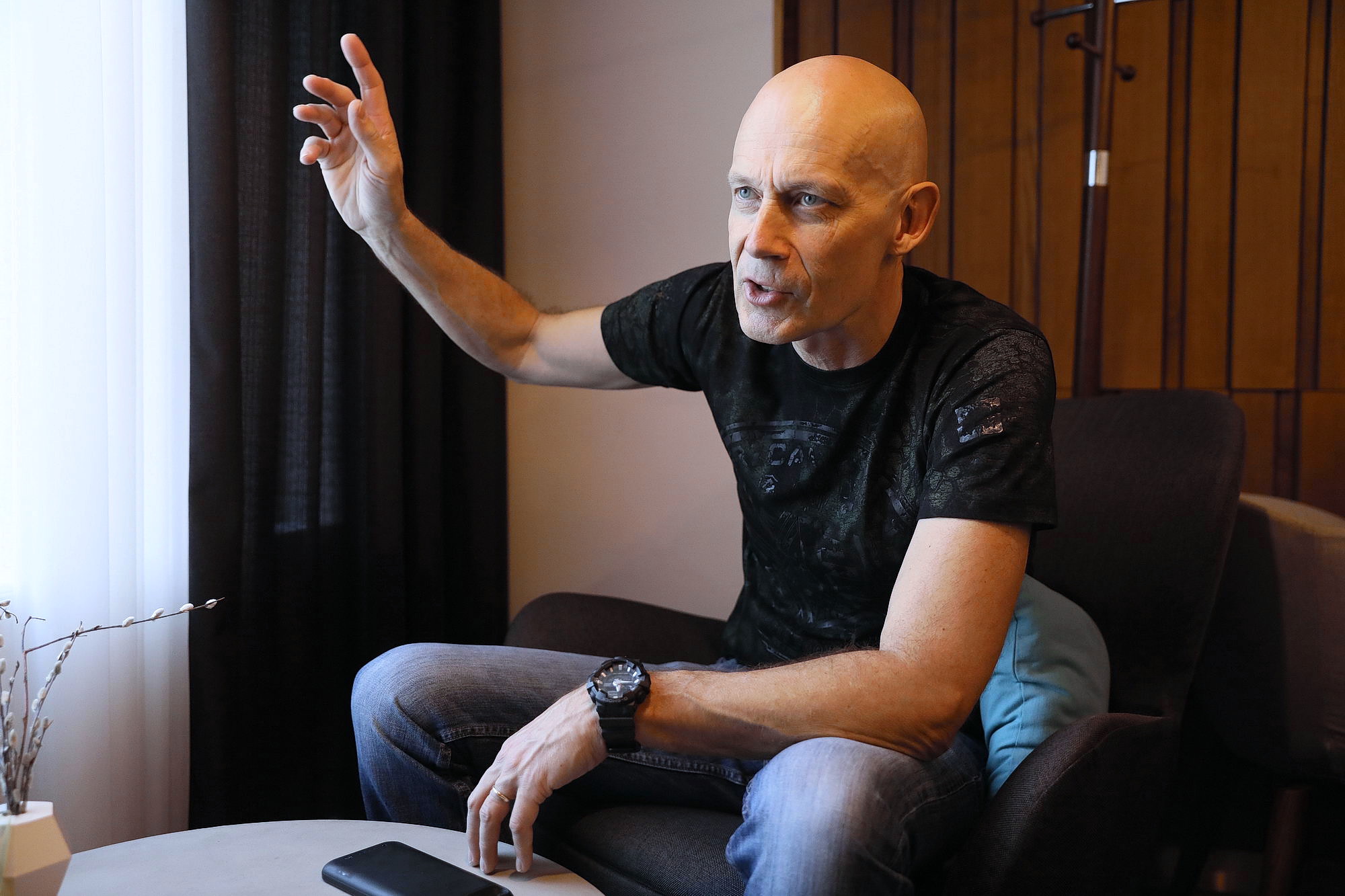
Wolf Hoffmann, the lead guitarist of German-American heavy metal band Accept, talks to the Kyiv Post before a show in Kyiv on Apr. 25, 2019. (Oleg Petrasiuk)
Back from the dead
Formed in West Germany in 1976, Accept released its debut album in 1979 — 40 years ago.
The young band gradually gained fame for its tense, aggressive, and brutal guitar riffs combined with melodic, ear-catching solos and, most importantly, the shrill, falsetto vocals of Udo Dirkschneider, another icon of the genre.
Accept’s global popularity peaked with the milestone records “Balls To The Wall” (1983), “Metal Heart” (1985), and “Russian Roulette” (1986), which became undisputed classics of the German school of heavy metal. However, amidst a general decline in metal’s popularity and after a number of far less successful works in the following years, Accept eventually split up in 1996.
Then, over a dozen years later in 2009, Accept was resurrected. Wolf Hoffmann reassembled the band again in the United States. The new lineup included American Mark Tornillo on vocals instead of Udo Dirkschneider, a distressing blow for many of the band’s old fans.
Nonetheless, to the great surprise of many, the resurrected band released a new album “Blood of the Nations” in 2010. It ended up being a huge success. For reasons that even Hoffmann himself cannot truly explain, their harsh and sharp back-to-the-roots metal was welcomed with open arms, and the band gained a second wind under its new frontman.
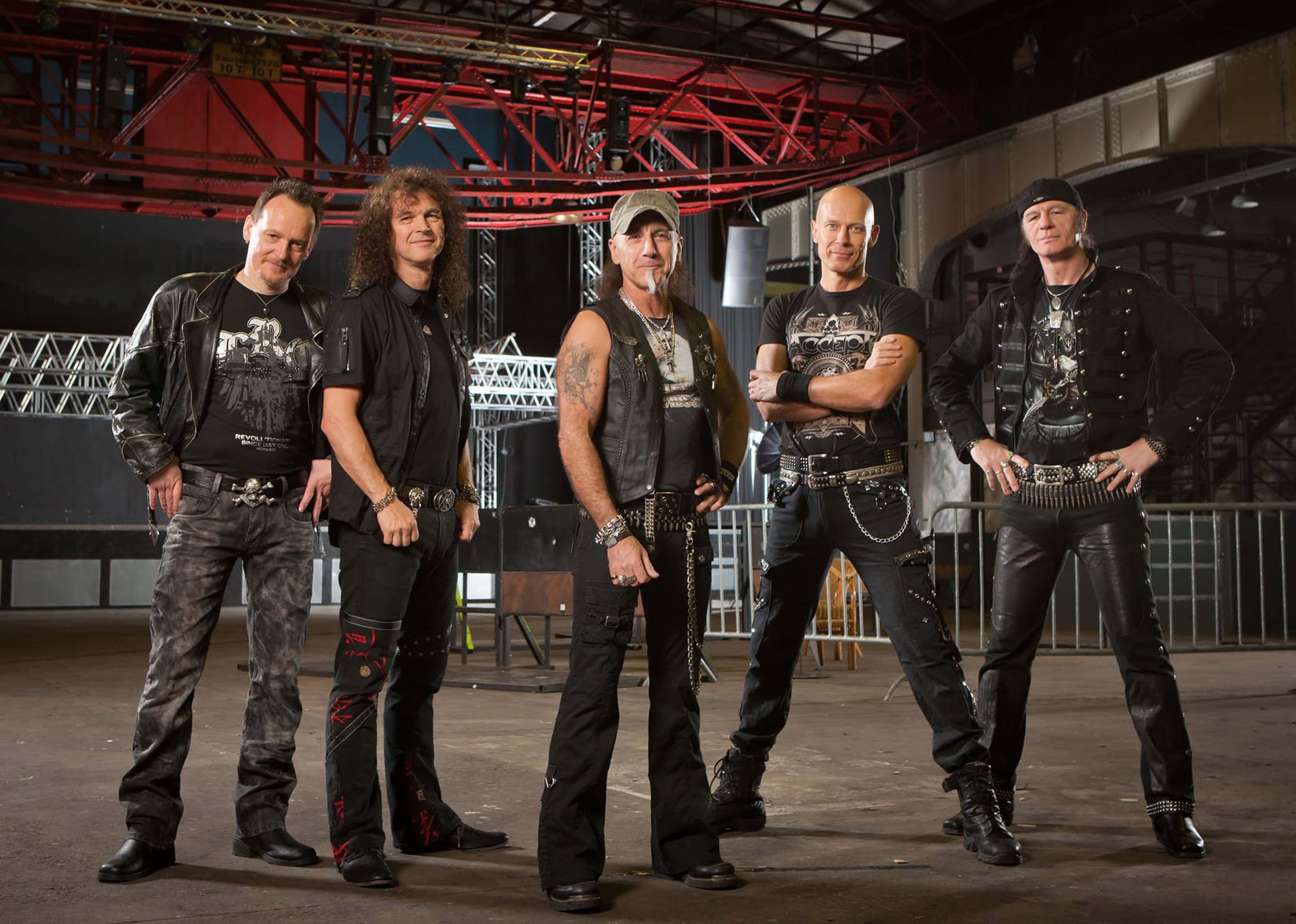
Accept’s lineup as of 2012, from right left to right: Stefan Schwarzmann (drums), Peter Baltes (bass), Mark Tornillo (vocals), Wolf Hoffmann (guitars), Herman Frank (guitars). (UNIAN)
Later, Accept continued their sudden comeback with the albums “Stalingrad” (2012), “Blind Rage” (2014), and “The Rise of Chaos” (2017).
In Ukraine — and all across the former Soviet Union — metalheads have appreciated Accept’s music since the 1980s. Their albums were passed from fan to fan on home-copied cassettes, an act of resistance against Soviet music bans. Numerous Soviet garage brands with little hope of ever seeing Accept onstage shamelessly plagiarized their riffs, melodies, and even logo.
Ukrainian metal fans’ dream came true only in 2012, when the band did their first-ever gig in Kyiv before a packed crowd at the StereoPlaza club. Since then, Accept has frequently played Ukraine’s concert halls, year after year.
Headbangers symphony
For these reasons, Kyiv was a natural stop on the band’s world tour with orchestras.
For Hoffmann, playing shows with a symphony orchestra had always been a big dream — one that came true with the release in 2018 of Accept’s live album “Symphonic Terror” recorded at the Wacken Open Air festival in Germany in front of 80,000 fans.
Along with Accept songs featuring symphonic accompaniment, the show also presented a number of metal versions of well-known classical pieces, such as “The Night on the Bald Mountain” by Modest Musorgskiy, Sergey Prokofiev’s “Dance of the Knights,” and Ludvig van Beethoven’s “Symphony No. 9.”
Now it looks like the slightly-neglected trend of rock bands playing with symphony orchestras is undergoing a revival. As recently as mid-March, another monster of rock, Metallica, announced a new gig with the San Francisco Symphony — 20 years after releasing their legendary live record featuring the orchestra, “S&M,” in 1999.
Hoffmann thinks it’s not surprising that so many metalheads have a soft spot for classical masterpieces.
“Classical music was sort of the metal of its days,” he told the Kyiv Post.
“Many of those orchestra compositions had some very powerful stuff in there — Pyotr Tsaikovskiy and many of his fellow composers were metal heroes of their time. But unfortunately, they didn’t have Marshall (amplifier) stacks and guitars. We’re all trying to express emotions with our music, but they were using the instruments they had 200 years ago, and we are using what we have today. It’s not that different really!”
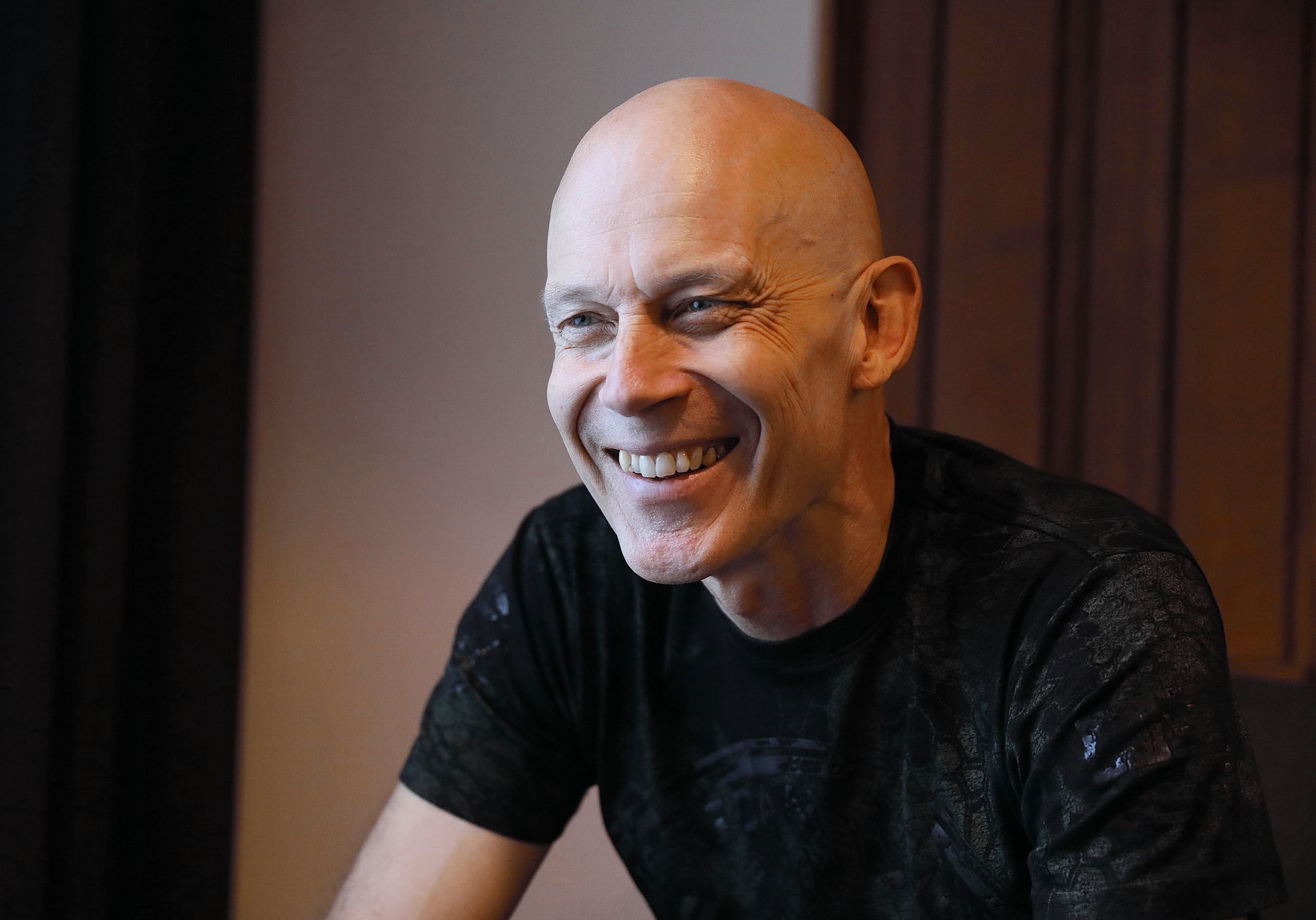
Wolf Hoffmann, the lead guitarist of German-American heavy metal band Accept, talks to the Kyiv Post before a show in Kyiv on April 25, 2019. (Oleg Petrasiuk)
If the giants of the classical music of the past, like Wolfgang Amadeus Mozart or Johann Sebastian Bach, were still alive, they would hopefully appreciate Accept’s music, Hoffmann said.
“But I’m not convinced we’re good enough for them,” he says. “Those guys were geniuses, and I would never say we are at a similar level. But I’m sure we could find a common ground.”
Accept has flirted with classical melodies throughout its career. For instance, one of the band’s best-known encore hits, “Metal Heart,” features two classical themes, namely Tchaikovsky’s “Slavonic March” in the intro and Beethoven’s “For Elise” in the main riff and solo.
Hoffmann himself has two solo albums with metal covers of academic musical masterpieces: “Classical” (released in 1997) and “Headbangers Symphony” (2016).
For the show in Ukraine, Accept needed a really good orchestra — and, very unexpectedly for fans, the choice was made in favor of the NAONI orchestra, which is known for playing purely Ukrainian folk music and featuring traditional Ukrainian instruments such as banduras, kobzas, and tsymbalys.
However, this is not the first time NAONI has collaborated with a modern band. During the Eurovision Song Contest in Kyiv in 2017, the orchestra also performed with electro-folk band Onuka, to huge acclaim from the international audience.
“We were looking for an orchestra that’s open-minded and well-grounded,” Hoffmann said.
“So our team made the connection and we ended up having the show together. They are good musicians, and that’s all that matters! They can read music and they are very intuitive.”
This mind-blowing collaboration — metal and Ukrainian classical folk, leather jackets and Ukrainian embroidered vyshyvanka shirts — with only one joint rehearsal held just hours before the evening show, ended up being a great deal of fun for both of groups.
“What’s fascinating for me is that I am a metal guy looking at the classical world at a distance,” Hoffmann said.
“Classical musicians are just the opposite. They are knee-deep in their classical world and they have no idea about heavy metal — and they don’t know who Accept is.”
“But together, we form this beautiful union on stage, which is very interesting. I can tell you about people that we played with in the last four shows — at the beginning, they didn’t know that to think, but after a show, they really enjoyed it! This is beautiful when it comes together like that.”
‘Unbelievable’
Apart from that, the legendary guitarist appears to be well-acquainted with the sights of Kyiv, naming the Golden Gate — the reconstructed ancient city wall entrance — and St. Michael’s Golden-Domed Monastery as being among his best loved locations in Ukraine’s capital city.
As the band visits Ukraine so frequently, Hoffmann is also well aware of events in the country over the past few years — the EuroMaidan Revolution and conflict with Russia — although he prefers to avoid commenting on sensitive issues, saying he is “just a performer not mixing music with politics.”
“I’m trying to stay informed about what’s happening here,” he said.
“We spoke about this with out road crew guys, and some of them don’t even know what’s going on. We were walking through (Kyiv) and I was like: ‘Do you guys know there’s a war in this country?’ — ‘Uh, a war? What war?’”
He was saddened by the fate of Russian-occupied Donetsk, where Accept had a show in December 2013, just months before the outbreak of war.
“I remember that Donetsk was as peaceful as Kyiv is now,” he said.
“We were walking through the city and found a big monument on a square — I think it was a Lenin monument. I took some pictures there. (The city) was great and peaceful, and we had a great show. And maybe six months later, there were news on TV that people were demonstrating, and tanks, and shooting, and bombing. Unbelievable!”
He was shocked to learn that Donetsk Airport, which he remembered from pre-war times, had been razed to the ground in the hostilities. Even the Druzhba Arena, the venue where the band had their show in Donetsk, was destroyed in May 2014. Accept was among the last artists to perform there.
Hoffmann also followed the latest presidential elections in Ukraine, which resulted in the overwhelming victory of Volodymyr Zelenskiy, a comedic actor with no experience in politics.
“I think it is a sign of the time,” Hoffmann said.
“Look at what’s happened in America (with the election of Donald Trump in 2016), where a guy who has never been in politics became the most powerful man in the world. I guess people are tired of the establishment, so they are quite desperate to try anything new. Anything new that could be better than what we already know.”
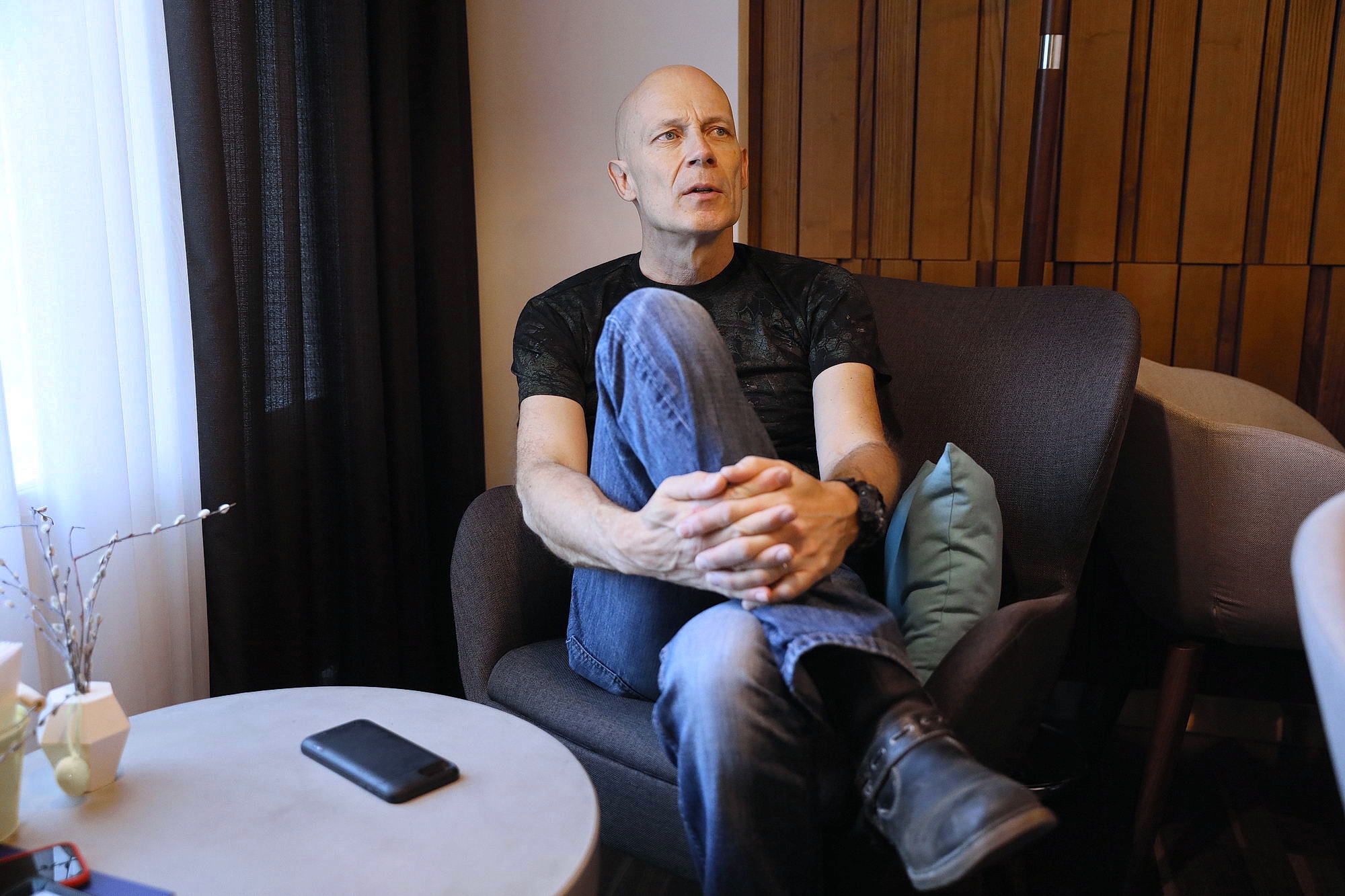
Wolf Hoffmann, the lead guitarist of German-American heavy metal band Accept, talks to the Kyiv Post before a show in Kyiv on Apr. 25, 2019. (Oleg Petrasiuk)
Last man on the ship
The list of Accept’s upcoming tour dates ends in late August. Immediately after that, the band will get back to America to lock themselves in the studio and compose their new, 16th album. Since last year, the band has been collecting fresh riffs for new tracks.
“My hard drive is full of ideas,” Hoffmann says. “That doesn’t mean they are all good! Sometimes I record bunches of crap that I don’t like later on.”
But fans should be expecting an album of 10-12 tracks at some point next year — another knock-out dose of good old 1980s-style heavy metal, but with modern production and mastering.
“It’s really hard to predict when it’s going to be released,” Hoffmann told the Kyiv Post.
“Because it’s ready when it’s ready, and you can only plan — the rest will have to come from the universe. Because you sit and write a song, and sometimes it goes like that, and on other days, it’s nothing. So you don’t really know when it comes and where it happens, and if it happens.”
“Everything else is just up to the gods of metal somewhere high above — or maybe deep below!” he laughs.
The next album, however, will be recorded in the absence of yet another important Accept veteran. In late 2018, Peter Baltes, the band’s lifelong bass player and songwriter, suddenly quit his music career, to the great disappointment of fans.
Although the band provided very little explanation for his retirement, most of the fans believe that Baltes simply decided to leave for a quiet life among the Christian community he leads in the United States.
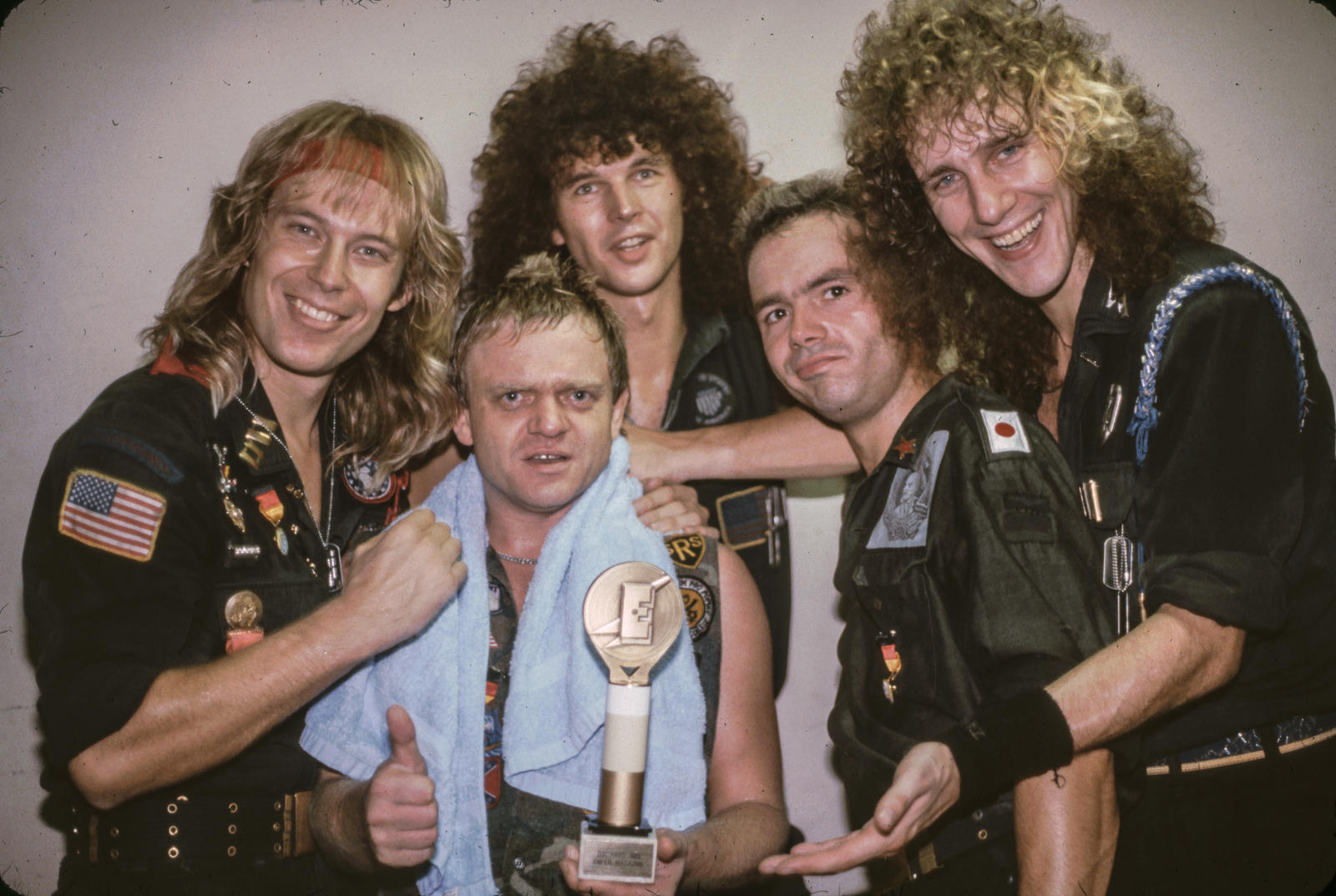
Accept lineup as of 1986, left to right: Wolf Hoffmann (guitars), Udo Dirkschneider (vocals), Peter Baltes (bass), Stefan Kaufmann (drums), Jorg Fischer (guitars) (Wolf Hoffmann Official Website)
Even the most die-hard metal musicians can get tired after 40 crazy years of living on the road.
“I think so too,” Hoffmann said. “Maybe he just had enough of touring the world. Honestly, he never really fully explained it to us. We just knew that something was wrong with Peter for a few months, and we tried to cheer him up. But he just made the decision privately, without consulting us, and just said: ‘This is it for me, guys.'”
For Hoffmann, it is a difficult twist of fate — in fact, with Peter Baltes’ retirement, he is the only remaining member of Accept’s “golden lineup” of the 1980s. And many old fans accuse him of not being entitled to use the band’s brand all alone and without the voice of Udo Dirkschneider, who has run his own solo project U.D.O. since 1987.
Hoffmann gets somewhat sad when talking about what happened with the group of friends that once formed one of the best heavy metal bands in history, but then split up amid quarrels. Even years after their breakup, Hoffmann and Dirkschneider, two icons of their genre, make bitter jibes about each other in their interviews.
“To me, it almost feels like we started a journey long ago, with a lot of people in the same boat,” Hoffmann said.
“And nobody quite knew where the journey was going to go. And then, one after another, (they) left the boat — and here I am, still standing on the deck. The last surviving guy, trying to steer the ship the best I can.”
